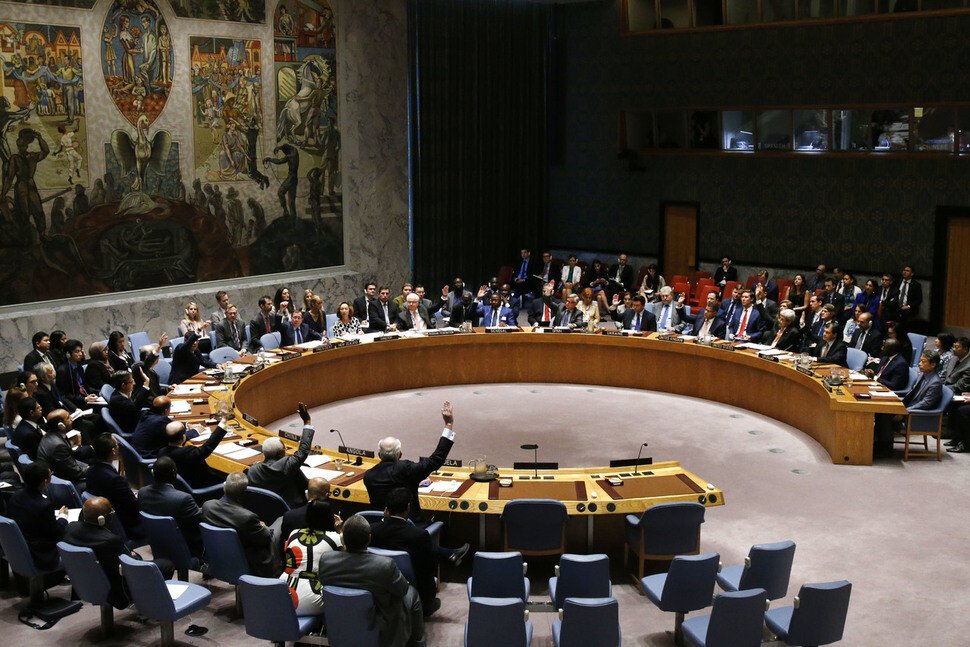hankyoreh
Links to other country sites 다른 나라 사이트 링크
UN Security Council adopts resolution seeking ratification of ban on nuke tests

On Sep. 23, the UN Security Council adopted a resolution calling on countries including the US, China and North Korea to ratify the Comprehensive Nuclear-Test-Ban Treaty (CTBT). This represents the final achievement in US President Barack Obama’s ambition to create a “nuclear-free world.”
During a plenary session on Sep. 23, the UN Security Council adopted a resolution calling for the CTBT to be made law. The treaty has been in limbo since it was adopted by the UN General Assembly in Sep. 1996. Fourteen of the 15 member states on the UN Security Council voted in favor of the resolution, with only Egypt, which is a non-permanent member, abstaining.
The CTBT is a treaty that bans nuclear testing by all countries. 188 countries have signed the treaty, and 166 countries have ratified it. In order for the treaty to take effect, however, it must be signed and ratified by the 44 countries that possess nuclear power, and eight countries are still refusing to do so. The US, China, Egypt, Iran and Israel have signed but not ratified the treaty, and North Korea, India and Pakistan have neither signed nor ratified it.
One of the countries that has been the most reluctant to move forward with the CTBT is the US. While the US signed the treaty during the presidency of Bill Clinton, its ratification was blocked by the Republican Party, which was in control of Congress at the time. President Barack Obama has also tried to ratify the treaty, but he has also been thwarted by opposition from Republicans.
As a result, Obama decided to put pressure on Congress through the indirect means of a UN Security Council resolution, and he has taken the lead in promoting the adoption of a resolution calling for the ratification of the CTBT. The Obama administration has also been trying to sway public opinion at home by presenting North Korea’s recent fifth nuclear test as an example of why it is necessary to ratify the CTBT. To be sure, there is virtually no chance that Congress (in which Republicans have a majority) will ratify the CTBT while Obama is still in office.
Vitaly Churkin, Russian ambassador to the UN, said that he hopes the next US president will be “more strident in his desire to ratify it.”
By Yi Yong-in, Washington correspondent
Please direct questions or comments to [english@hani.co.kr]

Editorial・opinion
![[Column] Has Korea, too, crossed the Rubicon on China? [Column] Has Korea, too, crossed the Rubicon on China?](https://flexible.img.hani.co.kr/flexible/normal/500/300/imgdb/original/2024/0419/9317135153409185.jpg) [Column] Has Korea, too, crossed the Rubicon on China?
[Column] Has Korea, too, crossed the Rubicon on China?![[Correspondent’s column] In Japan’s alliance with US, echoes of its past alliances with UK [Correspondent’s column] In Japan’s alliance with US, echoes of its past alliances with UK](https://flexible.img.hani.co.kr/flexible/normal/500/300/imgdb/original/2024/0419/2317135166563519.jpg) [Correspondent’s column] In Japan’s alliance with US, echoes of its past alliances with UK
[Correspondent’s column] In Japan’s alliance with US, echoes of its past alliances with UK- [Editorial] Does Yoon think the Korean public is wrong?
- [Editorial] As it bolsters its alliance with US, Japan must be accountable for past
- [Guest essay] Amending the Constitution is Yoon’s key to leaving office in public’s good graces
- [Editorial] 10 years on, lessons of Sewol tragedy must never be forgotten
- [Column] A death blow to Korea’s prosecutor politics
- [Correspondent’s column] The US and the end of Japanese pacifism
- [Guest essay] How Korea turned its trainee doctors into monsters
- [Guest essay] As someone who helped forge Seoul-Moscow ties, their status today troubles me
Most viewed articles
- 1[Column] The clock is ticking for Korea’s first lady
- 2[Correspondent’s column] In Japan’s alliance with US, echoes of its past alliances with UK
- 3Samsung barricades office as unionized workers strike for better conditions
- 4After 2 months of delayed, denied medical care, Koreans worry worst may be yet to come
- 5[Column] Has Korea, too, crossed the Rubicon on China?
- 6[Editorial] When the choice is kids or career, Korea will never overcome birth rate woes
- 7Hong Se-hwa, voice for tolerance whose memoir of exile touched a chord, dies at 76
- 8US overtakes China as Korea’s top export market, prompting trade sanction jitters
- 9Constitutional Court rules to disband left-wing Unified Progressive Party
- 10Nearly 1 in 5 N. Korean defectors say they regret coming to S. Korea